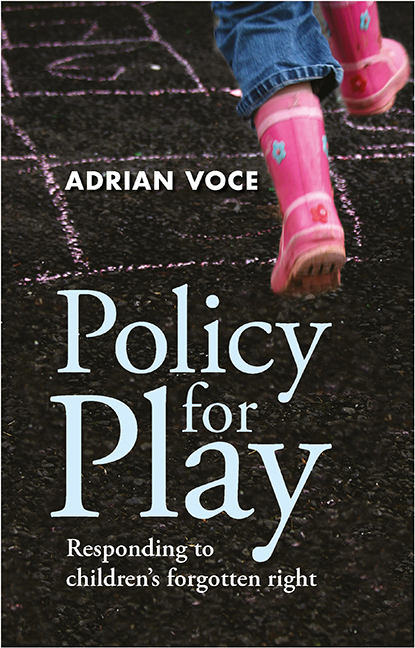Book contents
- Frontmatter
- Dedication
- Contents
- Who’s who
- About the author
- Preface
- Foreword
- Prologue
- Introduction ‘To respect, protect and fulfil’
- one ‘To play and to dream’ • Restoring play to the heart of the campaign for children’s rights
- two ‘For a change’ • Finding the evidence for play policy
- three ‘Advocates for play’ • Playwork’s place at the heart of the play movement
- four ‘New opportunities’ • Lottery funding and the beginnings of public play policy
- five ‘A vital and vibrant city’ • How devolved government in London set a benchmark for play policy
- six ‘Making the case’ • The call for a national play strategy
- seven ‘Things to do, places to go?’ • How play was overlooked by children’s services reform
- eight ‘Getting serious’ • The national play review
- nine ‘Lottery millions’ • The Children’s Play Initiative
- ten ‘Dirt is good’ • The Play England project
- eleven ‘The best place in the world’ • The Play Strategy for England
- twelve ‘Playbuilders’ • Breaking the mould of the public playground
- thirteen ‘Everyday adventures?’ • Austerity brings an end to play policy in England
- fourteen ‘Skylarks and canaries’ • The legacy of the Play Strategy
- fifteen ‘Children now’ • Responding to children’s right to play: conclusions and recommendations
- Epilogue
- References
- Index
nine - ‘Lottery millions’ • The Children’s Play Initiative
Published online by Cambridge University Press: 08 March 2022
- Frontmatter
- Dedication
- Contents
- Who’s who
- About the author
- Preface
- Foreword
- Prologue
- Introduction ‘To respect, protect and fulfil’
- one ‘To play and to dream’ • Restoring play to the heart of the campaign for children’s rights
- two ‘For a change’ • Finding the evidence for play policy
- three ‘Advocates for play’ • Playwork’s place at the heart of the play movement
- four ‘New opportunities’ • Lottery funding and the beginnings of public play policy
- five ‘A vital and vibrant city’ • How devolved government in London set a benchmark for play policy
- six ‘Making the case’ • The call for a national play strategy
- seven ‘Things to do, places to go?’ • How play was overlooked by children’s services reform
- eight ‘Getting serious’ • The national play review
- nine ‘Lottery millions’ • The Children’s Play Initiative
- ten ‘Dirt is good’ • The Play England project
- eleven ‘The best place in the world’ • The Play Strategy for England
- twelve ‘Playbuilders’ • Breaking the mould of the public playground
- thirteen ‘Everyday adventures?’ • Austerity brings an end to play policy in England
- fourteen ‘Skylarks and canaries’ • The legacy of the Play Strategy
- fifteen ‘Children now’ • Responding to children’s right to play: conclusions and recommendations
- Epilogue
- References
- Index
Summary
CPC’s role in first suggesting, then helping to design and deliver the Better Play Programme, had far-reaching consequences. Not least of these was the proximity it gave us to the senior team of a new, supersized funding body at a time when there was much to play for – and much to lose.
Unusually for the head of a large funder, New Opportunities Fund’s (NOF) Chief Executive Stephen Dunmore had taken a personal interest and involved himself directly in some of Better Play’s activities, particularly towards its latter stages. CPC’s partnership with Barnardo’s, one the country’s oldest, largest and most respected children’s charities, may well have helped to engender such a commitment – or perhaps it was simply that there is a ‘feel-good factor’ to good play projects that even CEOs find irresistible. Whatever the reason, Stephen Dunmore was a surprisingly frequent speaker at Better Play events and an engaging and interested contributor to the round of workshops that CPC and Barnardo’s staged to finalise the programme and help to inform its conclusions. Prominent among these was the challenge of sustaining new projects within a wider policy and funding climate still largely disinterested in children’s play.
In October 2004, there was still a good deal of uncertainty about the fate of the Play Review’s recommendations and the prospects for a Lottery programme for play. Many in the sector wanted us to challenge what was being seen as a broken promise to children and continue to put pressure on the government to honour its election pledge. Having met with Tessa Jowell, we knew that her response to Frank Dobson, which had been a long time coming and was made in full consideration of the imminent changes to the laws governing Lottery funding, was final.
Crucially, Frank Dobson was no longer a minister. His report was in the way of recommendations to the government and to the funder, NOF. It was not government policy and could not, therefore, be construed as ministerial directions. We knew that the best chance for a national funding programme for play now lay in persuading not the government, but the newly created Lottery distributor, that this would be a popular, successful and worthwhile use of £200 million.
- Type
- Chapter
- Information
- Policy for PlayResponding to Children's Forgotten Right, pp. 91 - 98Publisher: Bristol University PressPrint publication year: 2015



